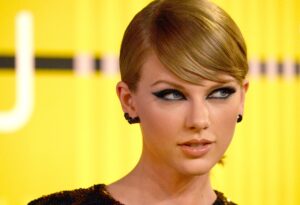Taylor Swift Breaks Open Trump-Harris Race Over AI Regulatory Policy... Because Sure, Why Not?
Obviously, Taylor Swift endorsing Kamala Harris is a law and technology story.
 Ever since J.D. Vance tried to turn the presidential election into a referendum on childless cat ladies, the prospect of the nation’s most powerful childless cat lady descending upon the contest took on an inevitability. When an ultimately bogus rumor broke out about the Democratic National Convention featuring a surprise guest on its last night, most of the speculation centered on Taylor Swift. Yet Swift remained above the fray until last night when she was finally inspired to announce her intentions…
Ever since J.D. Vance tried to turn the presidential election into a referendum on childless cat ladies, the prospect of the nation’s most powerful childless cat lady descending upon the contest took on an inevitability. When an ultimately bogus rumor broke out about the Democratic National Convention featuring a surprise guest on its last night, most of the speculation centered on Taylor Swift. Yet Swift remained above the fray until last night when she was finally inspired to announce her intentions…
By artificial intelligence regulatory policy.

Recently I was made aware that Al of ‘me` falsely endorsing Donald Trump’s presidential run was posted to his site. It really conjured up my fears around Al, and the dangers of spreading misinformation. It brought me to the conclusion that I need to be very transparent about my actual plans for this election as a voter. The simplest way to combat misinformation is with the truth.
Yes, the straw that broke this for Swift was artificial intelligence and the rise of deepfakes. Sure, why not? Swift is always good for inspiring a legal lesson.
Addressing deepfakes raises serious constitutional issues. A deepfake — on its own — is still speech and deserving of traditional First Amendment protection. But how that technology is leveraged can still cross the line into criminality. When someone tried to use an AI-assembled Joe Biden fake in a robocall to mislead voters, it resulted in an indictment and a call for new FCC regulations. However, efforts to proactively get ahead of deepfakes have stumbled over the Constitution. California penned an aggressive anti-deepfake law that alienated nearly everyone in the field.
This bill may be narrowly-crafted to target only perceived election interference, but that still isn’t enough to ward off possible Constitutional problems. For one, this law would punish anyone “knowingly” sharing something “deceptive.” The problem is the word “deceptive.” It doesn’t just cover deep fakes that put words in candidates’ mouths. It would also cover videos edited to show candidates in a bad light by taking comments or statements out of context. This has never been illegal before. Just because tech is allowing people to do scary new things with video processing tools is no reason to start criminalizing common campaign tactics.
Just the other day, the Senate released the final text of the proposed federal NO FAKES Act, attempting to solve the deepfake problem with a juiced up DMCA regime, which is just as dumb as it sounds. From the Electronic Frontier Foundation:
All of this is a recipe for private censorship. For decades, the DMCA process has been regularly abused to target lawful speech, and there’s every reason to suppose NO FAKES will lead to the same result.
What is worse, NO FAKES offers even fewer safeguards for lawful speech than the DMCA. For example, the DMCA includes a relatively simple counter-notice process that a speaker can use to get their work restored. NO FAKES does not. Instead, NO FAKES puts the burden on the speaker to run to court within 14 days to defend their rights. The powerful have lawyers on retainer who can do that, but most creators, activists, and citizen journalists do not.
Bringing everything back to Swift’s endorsement. As she put it, the only viable recourse at this juncture is transparency. That said, a legal regime that requires someone to publicly declare their voting intentions in a system predicated on the sanctity of secret balloting is… not ideal.
Earlier: Now *You* Can Take The Law School Class All About Taylor Swift
AI, Deepfakes, And Litigation: It’s Not Always What It Seems
 Joe Patrice is a senior editor at Above the Law and co-host of Thinking Like A Lawyer. Feel free to email any tips, questions, or comments. Follow him on Twitter or Bluesky if you’re interested in law, politics, and a healthy dose of college sports news. Joe also serves as a Managing Director at RPN Executive Search.
Joe Patrice is a senior editor at Above the Law and co-host of Thinking Like A Lawyer. Feel free to email any tips, questions, or comments. Follow him on Twitter or Bluesky if you’re interested in law, politics, and a healthy dose of college sports news. Joe also serves as a Managing Director at RPN Executive Search.







